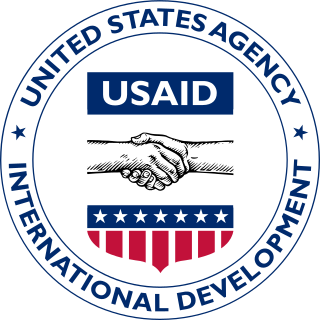
The United States Agency for International Development (USAID) is an independent agency of the U.S. federal government that is primarily responsible for administering civilian foreign aid and development assistance. With a budget of over $27 billion, USAID is one of the largest official aid agencies in the world and accounts for more than half of all U.S. foreign assistance—the highest in the world in absolute dollar terms.

Andrew S. Natsios is an American public servant and Republican politician from Massachusetts, who served in a number of positions in the administrations of Governor Paul Cellucci and President of the United States George W. Bush.
International Military Education and Training (IMET) is the title of a United States security assistance program, a type of student exchange program.
The Foreign Agricultural Service (FAS) is the foreign affairs agency with primary responsibility for the United States Department of Agriculture's (USDA) overseas programs – market development, international trade agreements and negotiations, and the collection of statistics and market information. It also administers the USDA's export credit guarantee and food aid programs and helps increase income and food availability in developing nations by mobilizing expertise for agriculturally led economic growth. The FAS mission statement reads, "Linking U.S. agriculture to the world to enhance export opportunities and global food security," and its motto is "Linking U.S. Agriculture to the World."
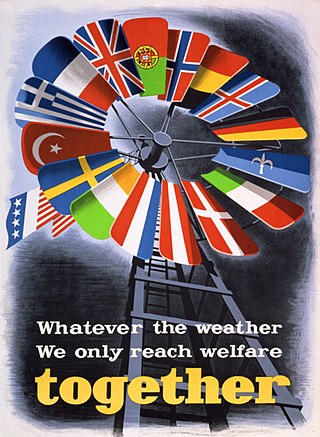
The Economic Cooperation Administration (ECA) was a U.S. government agency set up in 1948 to administer the Marshall Plan. It reported to both the State Department and the Department of Commerce. The agency's first head was Paul G. Hoffman, a former leader of car manufacturer Studebaker; he was succeeded by William Chapman Foster in 1950. The rest of the organization was also headed by major business figures such as Arthur A. Kimball as well as David K.E. Bruce.
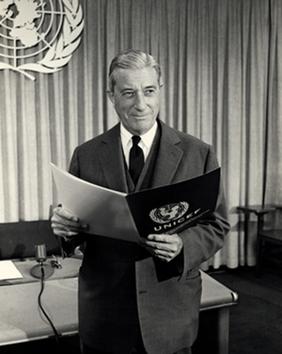
Henry Richardson Labouisse Jr. was an American diplomat and statesman. He was the third Director of the United Nations Relief and Works Agency for Palestine Refugees in the Near East (UNRWA) from 1954 to 1958. He was the director of the United Nations Children's Fund for years (1965–1979). He was also a member of the Council on Foreign Relations. A lawyer, he was United States Ambassador to France 1952–1954, as well as United States Ambassador to Greece 1962–1965. Labouisse had been the principal United States Department of State official dealing with the implementation of the Marshall Plan.

The Foreign Assistance Act is a United States law governing foreign aid policy. It outlined the political and ideological principles of U.S. foreign aid, significantly overhauled and reorganized the structure U.S. foreign assistance programs, legally distinguished military from nonmilitary aid, and created a new agency, the United States Agency for International Development (USAID) to administer nonmilitary economic assistance programs. Following its enactment by Congress on September 4, 1961, President John F. Kennedy signed the Act into law on November 3, 1961, issuing Executive Order 10973 detailing the reorganization.

Samuel Winfield Lewis was an American diplomat. During a lengthy career with the United States Department of State, he served as Assistant Secretary of State for International Organization Affairs (1975–1977), U.S. ambassador to Israel (1977–1985) and Director of Policy Planning (1993–1994). As ambassador to Israel, Lewis played a major part in brokering the Camp David Accords between Israel and Egypt. He also headed the United States Institute of Peace from 1987 through 1993.

The U.S. Trade and Development Agency (USTDA) is an independent agency of the United States government, formed in 1992 to advance economic development and U.S. commercial interests in developing and middle income countries.
The Office of Public Safety (OPS) was a U.S. government program within the United States Agency for International Development (USAID) that provided training, assistance and equipment to the security forces of U.S. allies. The program commenced in November 1962 and was terminated by Congress in 1974.
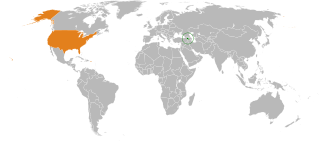
The dissolution of the Soviet Union in December 1991 brought an end to the Cold War and created the opportunity for bilateral relations of the United States with Armenia and other post-Soviet states as they began a political and economic transformation. The United States recognized the independence of Armenia on 25 December 1991, and opened an embassy in the capital city of Armenia, Yerevan in February 1992.

American–Uzbek relations formally began when the United States recognized the independence of Uzbekistan on December 25, 1991, and opened an embassy in Tashkent in March 1992. U.S.-Uzbekistan relations developed slowly and reached a peak following the U.S. decision to invade Afghanistan following the September 11, 2001 attacks. Relations cooled significantly following the "color revolutions" in the former Soviet republics of Georgia, Ukraine, and Kyrgyzstan in 2003–2005, and the Government of Uzbekistan sought to limit the influence of U.S. and other foreign non-governmental organizations (NGOs) working on civil society, political reform, and human rights inside the country.
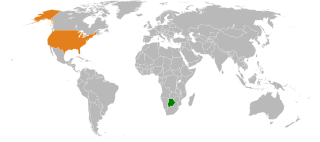
According to the 2012 U.S. Global Leadership Report, 79% of Botswana people approve of U.S. leadership, with 8% disapproving and 13% uncertain.
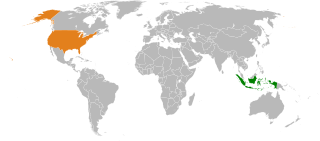
Indonesia and the United States established diplomatic relations in 1949. Relations are generally strong and close. Both are republics and recognize the strategic importance of their counterpart.

The United States and North Macedonia enjoy excellent bilateral relations.
United States foreign aid, also known as US foreign assistance consists of a variety of tangible and intangible forms of assistance the United States gives to other countries. Foreign aid is used to support American national security and commercial interests and can also be distributed for humanitarian reasons. Aid is financed from US taxpayers and other revenue sources that Congress appropriates annually through the United States budget process. It is dispersed through "over 20 U.S. government agencies that manage foreign assistance programs," although about half of all economic assistance is channeled through the United States Agency for International Development (USAID).
International Voluntary Services,Inc. (IVS) was a private, non-profit corporation for benevolent, charitable, and educational purposes chartered under the laws of the District of Columbia in 1953 to place volunteers in international humanitarian and development projects. From its founding until its dissolution in 2002, IVS placed volunteers in 39 countries in Asia, Africa, and Latin America. Its largest and longest programs were in South Vietnam, Laos, Algeria, and Bangladesh. Although the organization's roots were grounded in part in Christian pacifism, it operated on a nonsectarian basis, accepting volunteers regardless of their religious beliefs or nationality., Over its lifetime, the IVS program evolved from the placement of only American citizen volunteers to placement of internationally-recruited volunteers and then in later years to recruitment of local volunteers from within the country being assisted. Elements of the IVS program model have been adopted by the U.S. Peace Corps and many present day non-governmental organizations (NGOs). Sections below discuss the IVS program model, activities over time, and legacy.

United States aid to Sudan has three key objectives: a definitive end to conflict, gross human rights abuses, and genocide in Darfur; implementation of the north–south Comprehensive Peace Agreement that results in a peaceful post-2011 Sudan, or an orderly path toward two separate and viable states at peace with each other; and ensuring that Sudan does not provide a safe haven for international terrorist. Sudan has experienced two civil wars since 1955, the second of which lasted 22 years. During this time, the U.S. was the largest provider of foreign aid to Sudan, largely focused on humanitarian aid through the U.S. Agency for International Development. Sudan is listed as the U.S. government's highest priority in Africa due to "its importance for counter-terrorism and regional stability, as well as the magnitude of human rights and humanitarian abuses" U.S. foreign aid to Sudan has begun to see some positive indicators of performance although critical reaction has said that aid to Sudan is neither strategic nor focused.

Jordan has been granted considerate amounts of international aid moneys toward environmental conservation. Foreign aid goes into mitigation projects in the areas of water scarcity, loss of arable land for agriculture, and renewable energy. Moreover, foreign aid goes toward the development of the eco-tourism sector. Jordan receives aid from different kinds of international agents. Principal institutions that donate money toward environmentalism in Jordan are the Global Environmental Facility (GEF), United States Agency for International Development (USAID), and World Bank. Recently, Jordan has had problems to control its budgetary deficit, which directly affects its ability to manage its environmental problems. That has made some point out that Jordan depends on International aid to control environmental-related issues. One of the examples of that is related to the construction of the East Ghor Canal.














